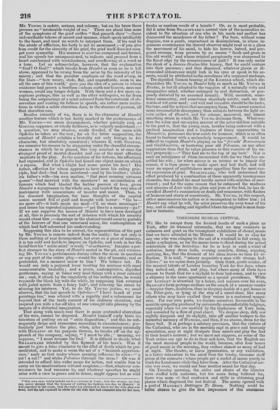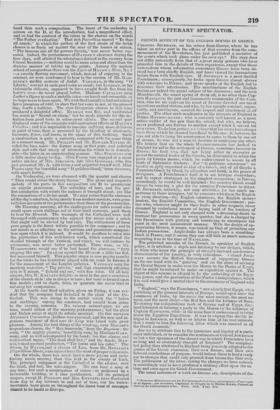YORKSHIRE MUSICAL FESTIVAL.
WE like to escape from the fevered bustle of such a place as York, after its triennial saturnalia, that we may ruminate in calmness and quiet on the triumphant exhibitions of choral music that we have attended in the Minster. It would be as easy for any one who was clinging to the sail of a windmill in full swing, to make a syllogism, as for the music-lover to think during the actual celebration of the festivities: for he is kept in such a whirl of oratorios, fancy dress balls, evening concerts, dining, supping, partying, &c., that the ferment of his ideas leaves no time for reflection. It is said, "misery acquaints a man with strange bedfellows :" so we opine does joviality. Only think, gentle reader, of the musical talents of London haunting York for five days, where they indeed eat, drink, and play, but where many of them have reason to thank God for a skylight to their bed-room, and to view a chimney in the same apartment as a special providence. While our LINDLEY is absorbed by a baker, and reposes over his oven, BRA HAM'S form perhaps reclines on the couch of a sausage-vender —happier there, doubtless, than in sleeping double at a pot-house in the Peter-gate, or lying at the step of a street-door, like many others who may have exalted their voices in a nocturnal symposion. For our own parts, we declare ourselves favourable to the amiable sympathy produced by universally-uncomfortable lodgings, especially when we are soothed by the tenderness of York ham, and consoled by a flow of good claret. We despise sleep, defy our nightly dungeon and its skylight, take off another bumper to the immortal memory of HANDEL, and then, if we choose, dress for the fancy ball. It is perhaps a salutary provision, that the visitors of the Cathedral, who are in the morning rapt in grave and heavenly speculation, may at night dissipate their minds and play the fool to their heart's content ; but we must not suppose, as some of the York critics are apt to do in their self-love, that the English are the most musical people in the world, because, after four hours of good music in the morning, they endure almost as many of bad at night. The theatre, or horse gymnastics, or any exhibition, is a better relaxation to the mind than the trashy, tiresome stuff given at the concerts ; where people get a surfeit of music purely to work the Londoners while they have them. After the Cathedral service was over, we would not hear another sound for that day. On Tuesday morning, the aisles and choirs of the Minster were stuffed with audience, but the seats being balloted for, there was none of that confusion and strife in obtaining good places which disgraced the last festival. The music opened with a part of HANDEL'S Dettingen Te Deum. Nothing could be better chosen to give the first impression of this enormous band than such a composition. The burst of the orchestra in unison on the D, at the introduction, had a magnificent effect, and so had the contrast of the voices in the chorus on the words " The Father everlasting." That rich Pureellian morsel " To thee all angels," in which the pathos of the first strain of the treble chorus is so finely set against the roar of the basses in unison, " The heavens and all the powers therein," was never better executed. Indeed, the performance of HANDEL'S choruses during the four days, well attested the advantages derived in the country from Choral Societies ;—nothing could be more crisp and clean than the decisive manner of taking up the points. Among the modern school of composition there was the Kyrie of HAYDN'S Mass, No. 7 —a sweetly flowing movement, which, instead of enjoying in the original, we were condemned to hear in the version of Mr. GARDINER'S medley oratorio of Judah. VAUGHAN, in the song " 0 Liberty," was not in such good voice as usual ; but LINDLEY, in his violoncello obligato, appeared to have caught fresh fire from his halter's oven—he never played better. Madame CATALAN' sang Luther's Hymn in such a metallic voice—so harsh and untunable, as we hope never to hear again. We wish the Committee had not oared her a premium of 600/. to show that her voice is not, at the present day, worth a farthing. The ,slow Gregorian chorus to this tune produced a delightful effect. BRAHAM was flat, and vociferated too much in "Sound an alarm," but he made amends for this defection from good taste in subsequent. efforts. The second part displayed some of the exquisite wind-instrument effects of HAYDN'S Creation.; and it is impossible to imagine anything more delicious in point of tone, than is produced by the blending of clarionets, bassoons, flutes, and horns, in the space of this building. Such a combination is quite a curiosity, compared with the same thing in a concert-room. Mr. Pinihars and Mr. EDWARD TAYLOR divided the bass solos : the former sang in that pure and polished style and with that nicety of intonation for which he is remarkable—the latter in an unpretending manner. Miss STEPHENS was a little matter sharp to-day. Miss PATON was engaged at a short notice (in lieu of Mrs. ATKINSON, late Miss GOODALL, who has just presented Mr. A. with twins,) and acquitted herself well. Miss PATON sang the beautiful song" If guiltless blood," from Susanna, with much feeling.
On Wednesday, we were charmed with the quartet and chorus "Then round about the starry throne." The grace and exquisite melody of the parts in this composition are fit to accompany an angelic procession. The subsiding of tone, and the perfect satisfaction with which the cadence is brought about, are like the emanations of a divine mind. We may notice that the choruses of this day's selection, being mostly from modern masters, were generally less accurate in the performance than those of the previous day.
On Thursday morning, all the clodhoppers for miles round who could spare seven shillings out of their hard earnings, paid them to hear the Messiah. The transepts of the Cathedral were well thronged with countrymen who enjoyed the music with a relish that might well be envied by bad ears. The enthusiasm of these poor people is the finest tribute possible to the composer ; and to our minds is as affecting as the sublime and passionate composition upon which it is induced. It would be needless to enter into the particulars of this well-known work, which constituted 'the
decided triumph of the Festival, and which, we will venture to pronounce, was never better performed. There were, as Mr. WORDSWORTH would say if he had heard the choruses, " forty
singing like one." BRAHAM opened the Messiah a little too flat, but recovered himself. This popular singer is now paying penalty
for the tricks he has heretofore played with his voice in forcing it for the amusement of the London galleries. VAUGHAN sang the masterly recitative, " Thy rebuke," and that exquisitely affecting
aria in E minor, " Behold and see," with fine taste. Of all lady. singers, Mrs. W. KNYVETT delights us most in the grave sweetness of the church style : she is always in tune ; her taste is formed upon fine models ; and in duets, trios, or quartets she never tries to out-sing her companions.
At the fourth and final selection given on Friday, it was evident that the company had dwindled in the choir of the Ca thedral. This was owing to the surfeit which the " babes and sucklings," among the amateurs, had caught from going to the evening concerts. No veteran concert-goer, we are sure, would sicken of the morning performances ; but the glees
and Italian songs at night do infinite mischief. On this occasion ATwoon's Coronation Anthem was executed, and his new and in genious treatment of God save the King was heard with great pleasure. Among the best things of the wind-up, were MOZART'S stupendous chorus, the " Rex tremendee," from the Requiem; the
song, "On mighty plumes," beautifully sung by Madame CARA DORI, and as well accompanied by the band; the fine chorus and well-worked fugue, "The dead shall live ;" and the finale, HAN DEL'S most poetical production, "The horse and his rider." The
Storm, by Hayreseand a chorus of LEO, from Mr. NOVELLO'S Fi/zicillium Music, were injured from the want of proper rehearsals. On the whole, there has never been a more joyous and satisfactory music meeting than this held in the county of York. The principal enjoyment at the Cathedral is the chorus, next the band, and last, the solo-singers. We can hear a song at any time, but such a congregation of voices—so mellowed by a favourable building, is a rare gratification. All the principal singers, except H. PHILLIPS and Mrs. ENYVETT, have fluctuated from day to day between in and out of tune, but the instrumentalists have given us throughout the finest treat of accompa
talent to be heard in Europe.



















 Previous page
Previous page